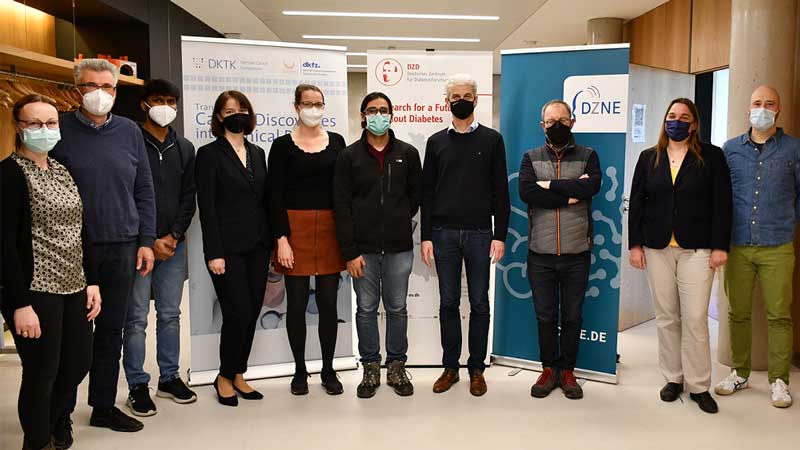Once a year the three German Centers for Health Research (DZG) in Dresden organize a joint DZG Symposium, this year the 4th time, hosted by the DZNE. Thought as a platform for exchange of scientist of the different institutions, this was held in a hybrid format for pandemic reasons.
In the welcome session the three speakers of the DZGs, Gerd Kempermann (DZNE), Mechthild Krause (DKTK) and Michele Solimena (DZD/PLID) highlighted the role of the DZGs for the biomedical campus in Dresden.
Since the TUD was able to win with Physics of Life (PoL) another Cluster of Excellence for Dresden, Prof. Stefan Diez (former Deputy Speaker of PoL and research group leader at the B CUBE - Center for Molecular Bioengineering at TU Dresden) was invited to give an overview about the development of the institute and the recruitment of the groups. He handed over to Dr. Natalie Anne Dye, research group leader at PoL and MSNZ Fellow, giving a presentation about her research topic biophysics of epithelial growth and tumorigenesis.
Since 2020 the three DZGs offer seed-funding grants for DZG-overarching projects which are intended to promote new translational activities between the DZGs in Dresden. The winners of the last call presented their research results at the annual meeting:
- Judith Houtman (DZNE) presented her project "Identification of epigenetic-driven changes in metabolic fluxes in a model of neural stem cell aging" with Karthikeyan Mohanraj (DZD/PLID).
- Ekaterina Balaian (DKTK) presented her project "The role of microbiome in Low Risk Myelodysplastic Syndromes" with Martin Bornhäuser (DKTK) and Triantafyllos Chavakis (DZD/PLID).
- Anna Poetsch (DKTK) presented her project "Epigenetic function of oxidative DNA damage on repetitive DNA" with Sukrit Mahajan (DKTK) and Abhinav Soni (DZNE).
Regardless of the limitations due to the pandemic the results were very promising and highlight the effective scientific interaction between the centers of health research in Dresden.
This year's Keynote lecture was given by Prof. Joachim Schultze, Director of Systems Medicine of the DZNE. He presented very interesting and promising insights in the topic of Swarm Learning, allowing different institutions to establish a common machine learning algorithm without the need to exchange the actual scientific data, an approach that has been shown to be very promising in the analysis of complex data sets of clinical and scientific dataset of genes, proteomics and metabolomics.
Finally, the meeting was closed by the announcement of the call for the next round of DZG-overarching projects by Prof. Michele Solimena. We are looking forward to the 5th DZG-meeting hopefully in presence hosted by the DZD/PLID in 2023.
The aim of the German Centers for Health Research (DZGs) is to generate optimal research conditions in order to fight common diseases as dementia, diabetes and cancer harboring a major burden for our society. Here, the DZGs in Dresden have a joint mission, to optimize the translation of research results to their application in patients in order to foster the prevention and treatment of these common diseases.
Dresden is a pioneer in the interaction of the DZGs, as it's three DZGs, the German Cancer Consortium (DKTK), the German Center for Neurodegenerative Diseases (DZNE) and the Paul Langerhans Institute Dresden (PLID) of the German Center for Diabetes Research (DZD), have been closely interconnected for several years. Although the research topics dementia, cancer and diabetes have a different scientific focus the overlap is unambiguously in terms of methodology and needed infrastructure. Here, the active networking of different DZGs reflects a unique opportunity to share methodology and open doors to new and innovative research strategies.
